*NURSING > EXAM > South University, Savannah > NSG 6005 Week 4 Study Guide(Latest) - Graded A+ (All)
South University, Savannah > NSG 6005 Week 4 Study Guide(Latest) - Graded A+
Document Content and Description Below
Chapter 17. Drugs Affecting the Respiratory System ____ 1. Digoxin levels need to be monitored closely when the following medication is started: 1. Loratadine 2. Diphenhydramine 3. Ipratropium ... 4. Albuterol ____ 2. Patients with pheochromocytoma should avoid which of the following classes of drugs because of the possibility of developing hypertensive crisis? 1. Expectorants 2. Beta-2-agonists 3. Antitussives 4. Antihistamines ____ 3. Harold, a 42-year-old African American, has moderate persistent asthma. Which of the following asthma medications should be used cautiously, if at all? 1. Betamethasone, an inhaled corticosteroid 2. Salmeterol, an inhaled long-acting beta-agonist 3. Albuterol, a short-acting beta-agonist 4. Montelukast, a leukotriene modifier ____ 4. Long-acting beta-agonists (LTBAs) received a Black Box Warning from the U.S. Food and Drug Administration due to the: 1. Risk of life-threatening dermatological reactions 2. Increased incidence of cardiac events when LTBAs are used 3. Increased risk of asthma-related deaths when LTBAs are used 4. Risk for life-threatening alterations in electrolytes ____ 5. The bronchodilator of choice for patients taking propranolol is: 1. Albuterol 2. Pirbuterol 3. Formoterol 4. Ipratropium ____ 6. James is a 52-year-old overweight smoker taking theophylline for his persistent asthma. He tells his provider he is going to start the Atkin’s diet for weight loss. The appropriate response would be: 1. Congratulate him on making a positive change in his life. 2. Recommend he try stopping smoking instead of the Atkin’s diet. 3. Schedule him for regular testing of serum theophylline levels during his diet due to increased excretion of theophylline. 4. Decrease his theophylline dose because a high-protein diet may lead to elevated theophylline levels. ____ 7. Li takes theophylline for his persistent asthma and calls the office with a complaint of nausea, vomiting, and headache. The best advice for him would be to: 1. Reassure him this is probably a viral infection and should be better soon 2. Have him seen the same day for an assessment and theophylline level 3. Schedule him for an appointment in 2 to 3 days, which he can cancel if he is better 4. Order a theophylline level at the laboratory for him ____ 8. Tiotropium bromide (Spiriva) is an inhaled anticholinergic: 1. Used for the treatment of chronic obstructive pulmonary disease (COPD) 2. Used in the treatment of asthma 3. Combined with albuterol for treatment of asthma exacerbations 4. Combined with fluticasone for the treatment of persistent asthma ____ 9. Christy has exercise-induced and mild persistent asthma and is prescribed two puffs of albuterol 15 minutes before exercise and as needed for wheezing. One puff per day of beclomethasone (QVAR) is also prescribed. Teaching regarding her inhalers includes: 1. Use one to two puffs of albuterol per day to prevent an attack with no more than eight puffs per day 2. Beclomethasone needs to be used every day to treat her asthma 3. Report any systemic side effects she is experiencing, such as weight gain 4. Use the albuterol metered-dose inhaler (MDI) immediately after her corticosteroid MDI to facilitate bronchodilation ____ 10. When prescribing montelukast (Singulair) for asthma, patients or parents of patients should be instructed: 1. Montelukast twice a day is started when there is an asthma exacerbation. 2. Patients may experience weight gain on montelukast. 3. Aggression, anxiety, depression, and/or suicidal thoughts may occur when taking montelukast. 4. Lethargy and hypersomnia may occur when taking montelukast. ____ 11. Montelukast (Singulair) may be prescribed for: 1. A 6-year-old child with exercise-induced asthma 2. A 2-year-old child with moderate persistent asthma 3. An 18-month-old child with seasonal allergic rhinitis 4. None of the above; montelukast is not approved for use in children ____ 12. The known drug interactions with the inhaled corticosteroid beclomethasone (QVAR) include: 1. Albuterol 2. MMR vaccine 3. Insulin 4. None of the above ____ 13. When educating patients who are starting on inhaled corticosteroids, the provider should tell them that: 1. They need to get any live vaccines before starting the medication. 2. Inhaled corticosteroids need to be used daily during asthma exacerbations to be effective. 3. Patients should rinse their mouths out after using the inhaled corticosteroid to prevent thrush. 4. They can triple the dose number of inhalations of medication during colds to prevent needing systemic steroids. ____ 14. Patients with allergic rhinitis may benefit from a prescription of: 1. Fluticasone (Flonase) 2. Cetirizine (Zyrtec) 3. OTC cromolyn nasal spray (Nasalcrom) 4. Any of the above ____ 15. Howard is a 72-year-old male who occasionally takes diphenhydramine for his seasonal allergies. Monitoring for this patient taking diphenhydramine would include assessing for: 1. Urinary retention 2. Cardiac output 3. Peripheral edema 4. Skin rash ____ 16. First-generation antihistamines such as loratadine (Claritin) are prescribed for seasonal allergies because they are: 1. More effective than first-generation antihistamines 2. Less sedating than the first-generation antihistamines 3. Prescription products, therefore are covered by insurance 4. Able to be taken with central nervous system (CNS) sedatives, such as alcohol ____ 17. When recommending dimenhydrinate (Dramamine) to treat motion sickness, patients should be instructed to: 1. Take the dimenhydrinate after they get nauseated 2. Drink lots of water while taking the dimenhydrinate 3. Take the dimenhydrinate 15 minutes before it is needed 4. Double the dose if one tablet is not effective ____ 18. Decongestants such as pseudoephedrine (Sudafed): 1. Are Schedule III drugs in all states 2. Should not be prescribed or recommended for children under 4 years of age 3. Are effective in treating the congestion children experience with the common cold 4. May cause drowsiness in patients of all ages ____ 19. Cough and cold medications that contain a sympathomimetic decongestant such as phenylephrine should be used cautiously in what population: 1. Older adults 2. Hypertensive patients 3. Infants 4. All of the above ____ 20. Martin is a 60-year-old patient with hypertension. The first-line decongestant to prescribe would be: 1. Oral pseudoephedrine 2. Oral phenylephrine 3. Nasal oxymetazoline 4. Nasal azelastine ____ 21. The first-line treatment for cough related to an upper respiratory tract infection (URI) in a 5-year-old child is: 1. Fluids and symptomatic care Chapter 30. Asthma and Chronic Obstructive Pulmonary Disease ____ 1. Prior to developing a plan for the treatment of asthma, the patient’s asthma should be classified according to the NHLBI Expert Panel 3 guidelines. In adults mild-persistent asthma is classified as asthma symptoms that occur: 1. Daily 2. Daily and limit physical activity 3. Less than twice a week 4. More than twice a week and less than once a day ____ 2. In children age 5 to 11 years mild-persistent asthma is diagnosed when asthma symptoms occur: 1. At nighttime one to two times a month 2. At nighttime three to four times a month 3. Less than twice a week 4. Daily ____ 3. One goal of asthma therapy outlined by the NHLBI Expert Panel 3 guidelines is: 1. Ability to use albuterol daily to control symptoms 2. Minimize exacerbations to once a month 3. Keep nighttime symptoms at a maximum of twice a week 4. Require infrequent use of beta 2 agonists (albuterol) for relief of symptoms ____ 4. A stepwise approach to the pharmacologic management of asthma: 1. Begins with determining the severity of asthma and assessing asthma control 2. Is used when asthma is severe and requires daily steroids 3. Allows for each provider to determine their personal approach to the care of asthmatic patients 4. Provides a framework for the management of severe asthmatics, but is not as helpful when patients have intermittent asthma ____ 5. Treatment for mild intermittent asthma is: 1. Daily inhaled medium-dose corticosteroids 2. Short-acting beta-2-agonists (albuterol) as needed 3. Long-acting beta-2-agonists every morning as a preventative 4. Montelukast (Singulair) daily ____ 6. The first-line therapy for mild-persistent asthma is: 1. High-dose montelukast 2. Theophylline 3. Low-dose inhaled corticosteroids 4. Long-acting beta-2-agonists ____ 7. Monitoring a patient with persistent asthma includes: 1. Monitoring how frequently the patient has an upper respiratory infection (URI) during treatment 2. Monthly in-office spirometry testing 3. Determining if the patient has increased use of his or her long-acting beta-2-agonist due to exacerbations 4. Evaluating the patient every 1 to 6 months to determine if the patient needs to step up or down in their therapy ____ 8. Asthma exacerbations at home are managed by the patient by: 1. Increasing frequency of beta-2-agonists and contacting their provider 2. Doubling inhaled corticosteroid doses 3. Increasing frequency of beta-2-agonists 4. Starting montelukast (Singulair) ____ 9. Patients who are at risk of a fatal asthma attack include patients: 1. With moderate persistent asthma 2. With a history of requiring intubation or ICU admission for asthma 3. Who are on daily inhaled corticosteroid therapy 4. Who are pregnant ____ 10. Pregnant patients with asthma may safely use ________ throughout their pregnancy. 1. Oral terbutaline 2. Prednisone 3. Inhaled corticosteroids (budesonide) 4. Montelukast (Singulair) ____ 11. One goal of asthma management in children is: 1. They independently manage their asthma 2. Participation in school and sports activities 3. No exacerbations 4. Minimal use of inhaled corticosteroids ____ 12. Medications used in the management of patients with chronic obstructive pulmonary disease (COPD) include: 1. Inhaled beta-2-agonists 2. Inhaled anticholinergics (ipratropium) 3. Inhaled corticosteroids 4. All of the above ____ 13. Patients with a COPD exacerbation may require: 1. Doubling of inhaled corticosteroid dose 2. Systemic corticosteroid burst 3. Continuous inhaled beta-2-agonists 4. Leukotriene therapy ____ 14. Patients with COPD require monitoring of: 1. Beta-2-agonist use 2. Serum electrolytes 3. Blood pressure 4. Neuropsychiatric effects of montelukast ____ 15. Education of patients with COPD who use inhaled corticosteroids includes: 1. Doubling the dose at the first sign of a URI 2. Using their inhaled corticosteroid first and then their bronchodilator 3. Rinsing their mouth after use 4. Abstaining from smoking for at least 30 minutes after using ____ 16. Education for patients who use an inhaled beta-agonist and an inhaled corticosteroid includes: 1. Use the inhaled corticosteroid first, followed by the inhaled beta-agonists. 2. Use the inhaled beta-agonist first, followed by the inhaled corticosteroid. 3. Increase fluid intake to 3 liters per day. [Show More]
Last updated: 1 year ago
Preview 1 out of 6 pages
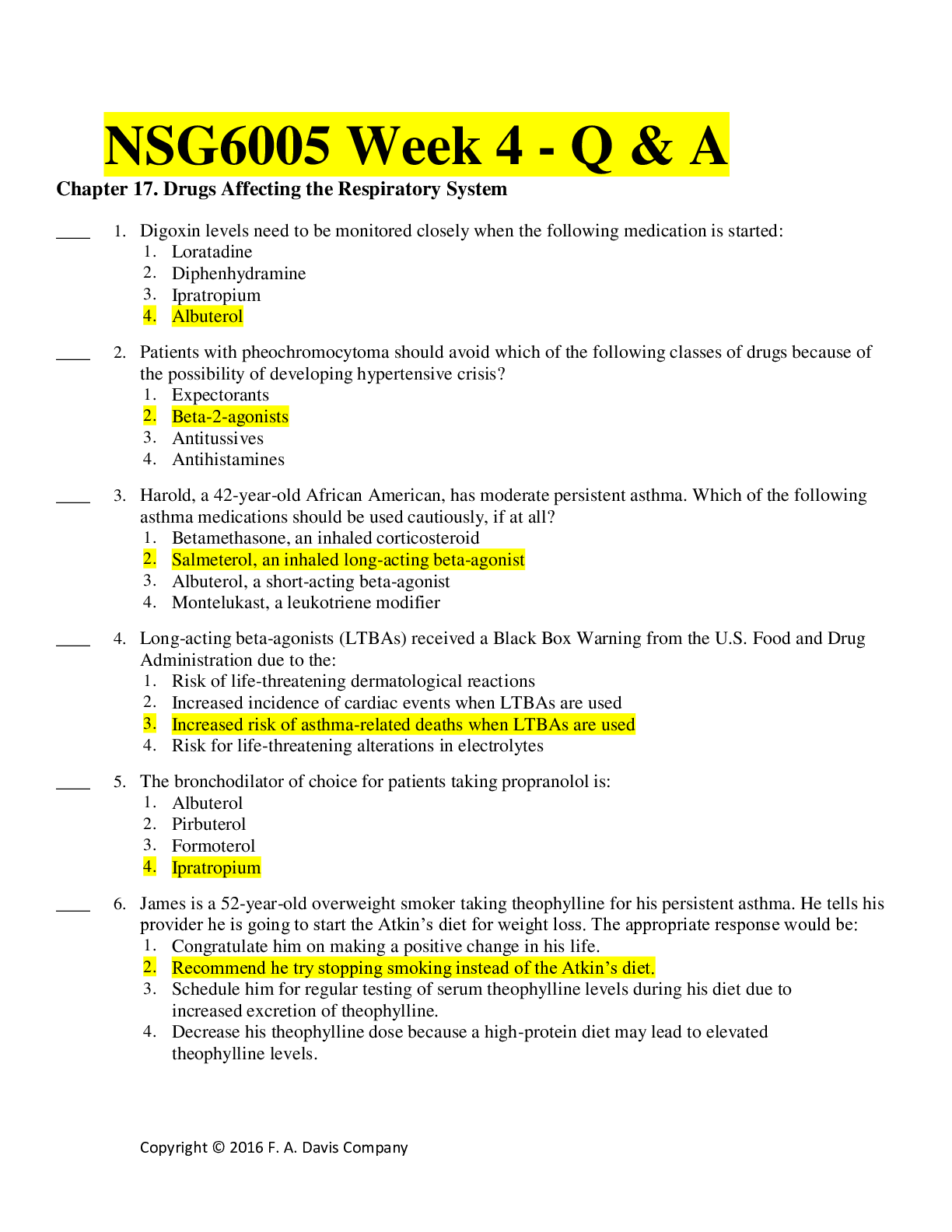
Reviews( 0 )
Recommended For You
Pharmacology> EXAM > NSG 6005 Week 4 Pharm Quiz Fall 2019 – South University Savannah / NSG 6005 Week 4 Pharm Quiz Fall 2019 (All)
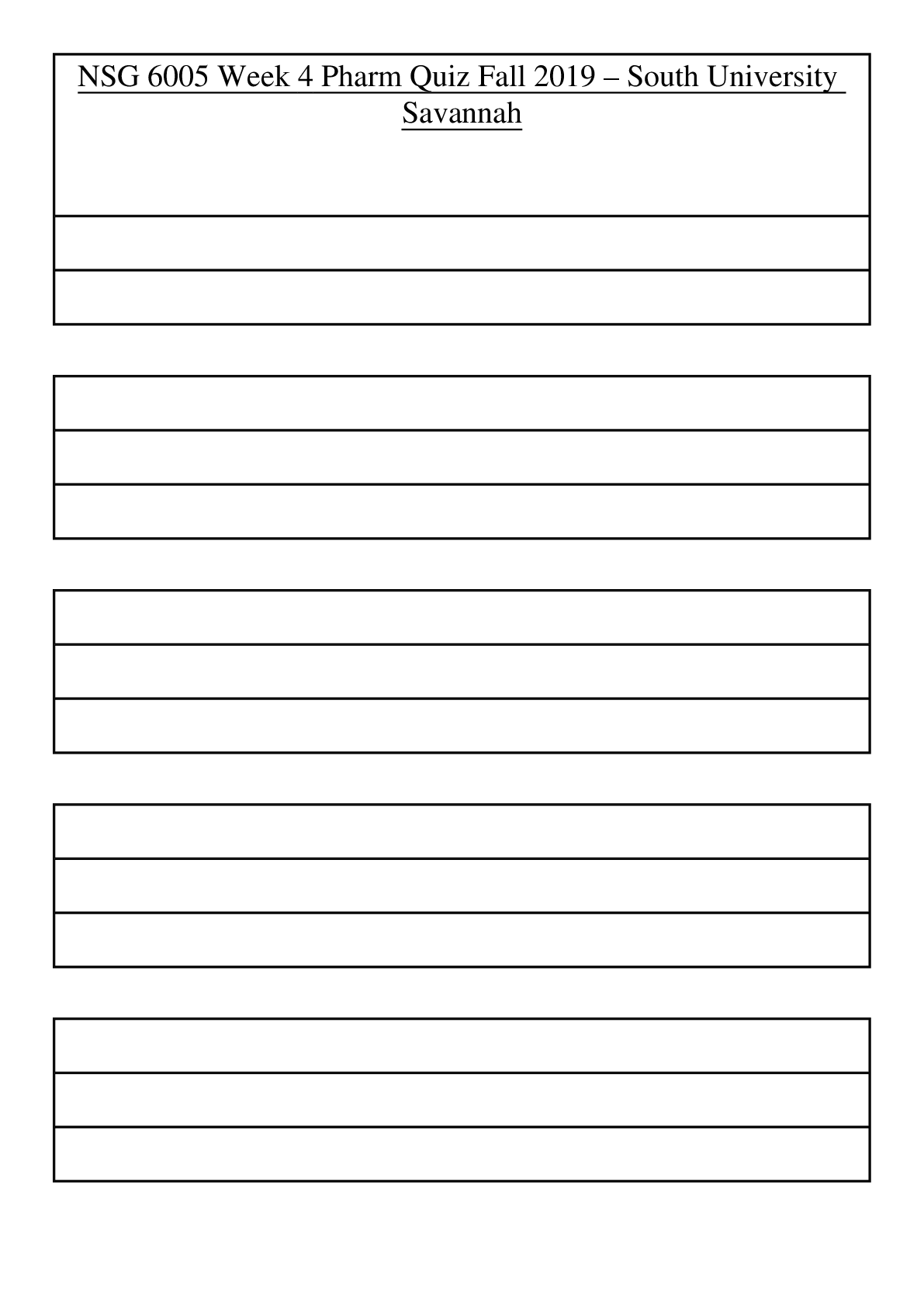
NSG 6005 Week 4 Pharm Quiz Fall 2019 – South University Savannah / NSG 6005 Week 4 Pharm Quiz Fall 2019
NSG 6005 Week 4 Pharm Quiz Fall 2019 – South University Savannah 1. Question : When using the “step-up” approach in caring for a patient with GERD, the “step up” from OTC antacid use is:...
By Martin Freeman , Uploaded: May 28, 2020
$10
*NURSING> EXAM > NSG6005 Week 4 Quiz / NSG 6005 Week 4 Quiz (2 New Versions, 2020): South University (SATISFACTION GUARANTEED) (All)
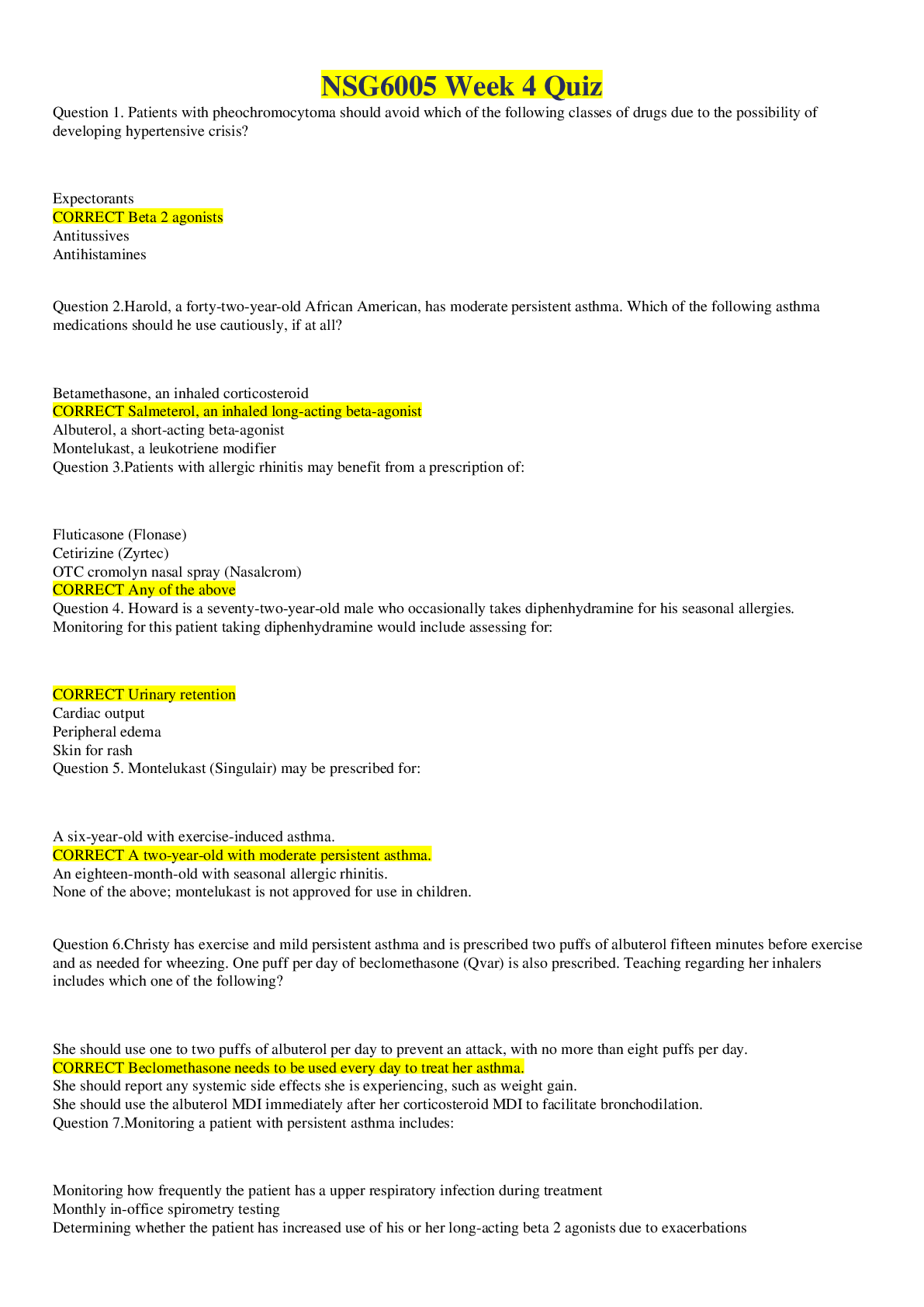
NSG6005 Week 4 Quiz / NSG 6005 Week 4 Quiz (2 New Versions, 2020): South University (SATISFACTION GUARANTEED)
NSG6005 Week 4 Quiz Question 1. Patients with pheochromocytoma should avoid which of the following classes of drugs due to the possibility of developing hypertensive crisis? Expectorants...
By Succeed , Uploaded: May 07, 2020
$7
*NURSING> EXAM > NSG 6005 / NSG6005 WEEK 4 EXAM. QUESTIONS AND ANSWERS. (All)
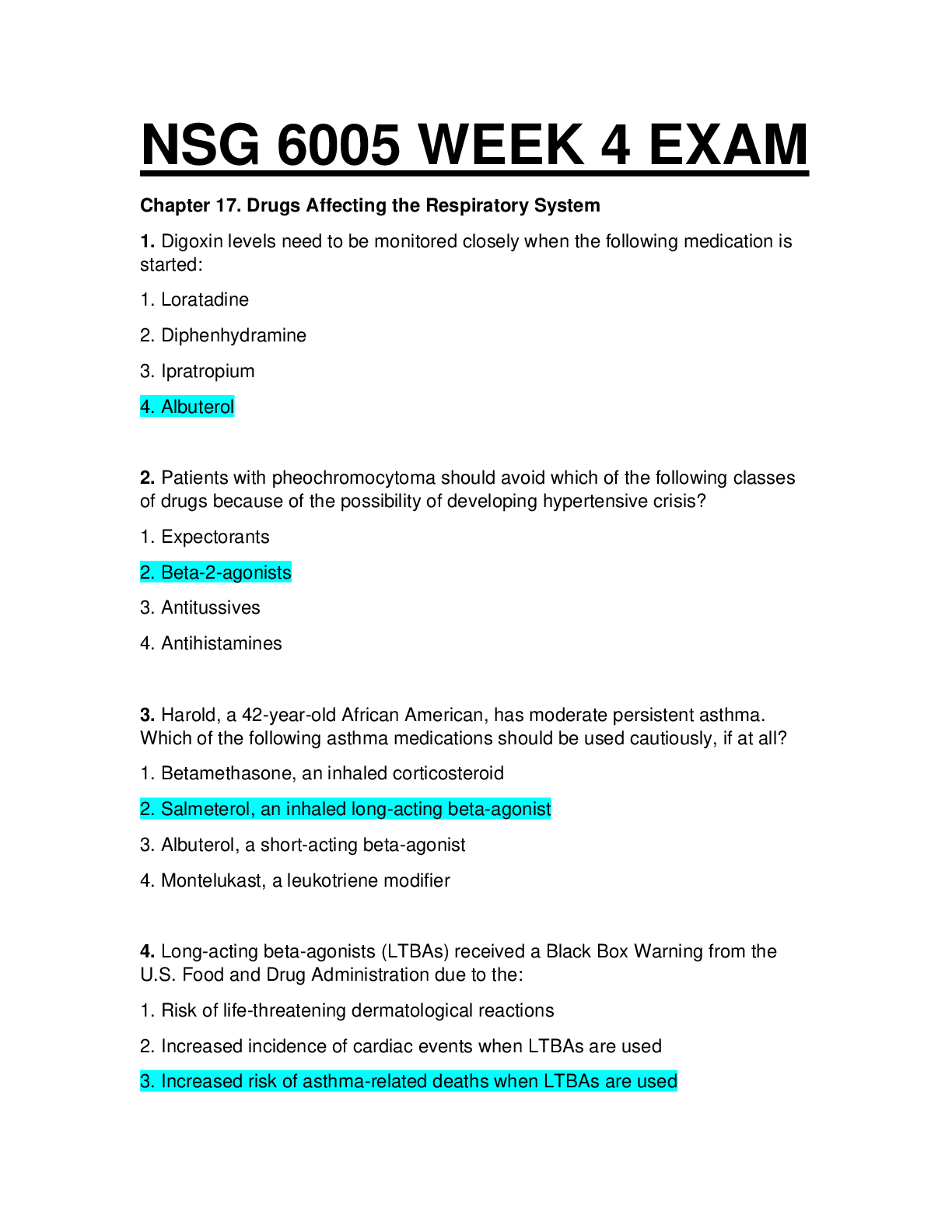
NSG 6005 / NSG6005 WEEK 4 EXAM. QUESTIONS AND ANSWERS.
hapter 17. Drugs Affecting the Respiratory System Chapter 30. Asthma and Chronic Obstructive Pulmonary Disease
By Tashaj , Uploaded: Jul 07, 2021
$8
Pharmacology> EXAM > NSG 6005 Week 4 Pharmacology Quiz Fall 2020 | NSG6005 Week 4 Pharmacology Quiz_Graded A (All)

NSG 6005 Week 4 Pharmacology Quiz Fall 2020 | NSG6005 Week 4 Pharmacology Quiz_Graded A
NSG 6005 Week 4 Pharm Quiz Fall 2020 – South University Savannah 1. Question : When using the “step-up” approach in caring for a patient with GERD, the “step up” from OTC antacid use is: Studen...
By Elli , Uploaded: May 05, 2021
$10.5
*NURSING> EXAM > NSG 6005 Week 4 Knowledge Check Quiz 2 (All)
.png)
NSG 6005 Week 4 Knowledge Check Quiz 2
Question 1.Patients with pheochromocytoma should avoid which of the following classes of drugs due to the possibility of developing hypertensive crisis? Question 2.Harold, a forty-two-year-old Afri...
By BAW , Uploaded: Mar 26, 2021
$13
*NURSING> EXAM > NSG 6005 Week 4 Knowledge Check Quiz 2-RATED A/DOWNLOAD TO GET A (All)
.png)
NSG 6005 Week 4 Knowledge Check Quiz 2-RATED A/DOWNLOAD TO GET A
NSG 6005 Week 4 Knowledge Check Quiz 2 Question 1.Patients with pheochromocytoma should avoid which of the following classes of drugs due to the possibility of developing hypertensive crisis? Ques...
By Nicky , Uploaded: Dec 27, 2020
$7.5
*NURSING> EXAM > NSG 6005 Week 4 Knowledge 2 - Check, Asthma, Decongestants-RATED A/DOWNLOAD TO GET A (All)
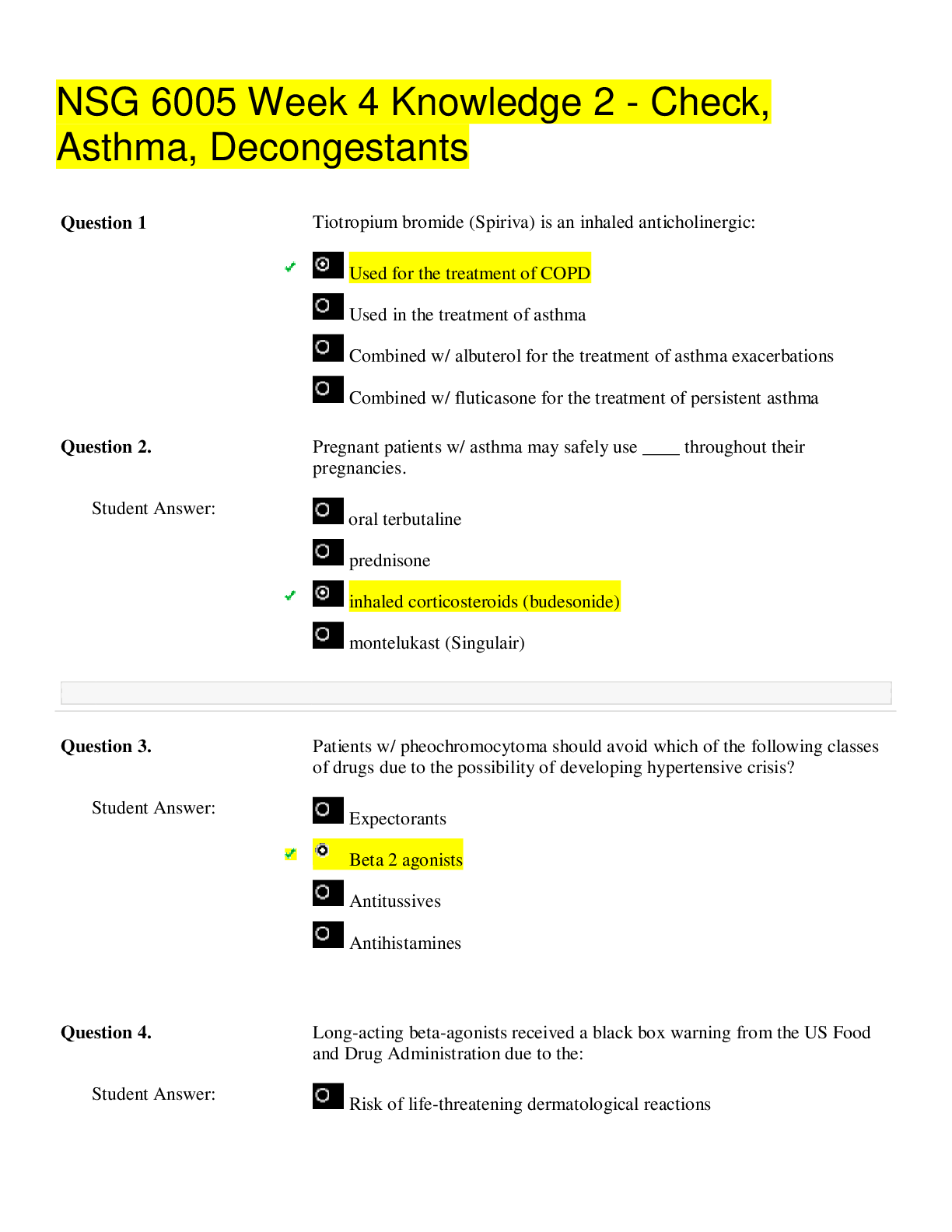
NSG 6005 Week 4 Knowledge 2 - Check, Asthma, Decongestants-RATED A/DOWNLOAD TO GET A
1.Tiotropium bromide (Spiriva) is an inhaled anticholinergic: 2.Pregnant patients w/ asthma may safely use ____ throughout their pregnancies. 3.Patients w/ pheochromocytoma should avoid which of...
By Nicky , Uploaded: Dec 27, 2020
$10
*NURSING> EXAM > NSG 6005 WEEK 4 QUIZ (2 VERSIONS) / NSG6005 WEEK 4 QUIZ (LATEST): SOUTH UNIVERSITY |100% CORRECT ANSWERS, DOWNLOAD TO SCORE A | (All)
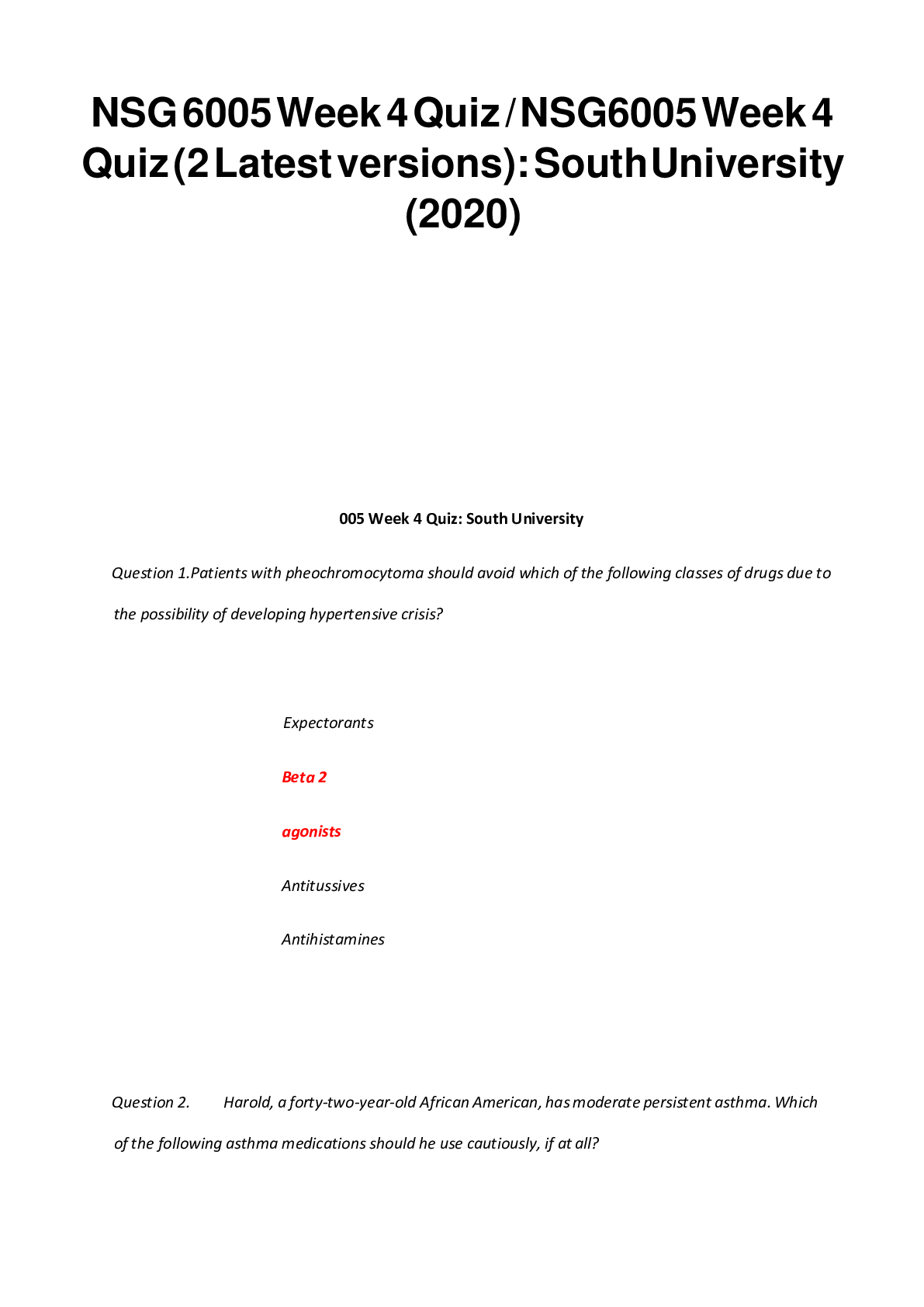
NSG 6005 WEEK 4 QUIZ (2 VERSIONS) / NSG6005 WEEK 4 QUIZ (LATEST): SOUTH UNIVERSITY |100% CORRECT ANSWERS, DOWNLOAD TO SCORE A |
NSG 6005 Week 4 Quiz / NSG6005 Week 4 Quiz (Latest): South University South University NSG 6005 Week 4 Quiz / South University NSG6005 Week 4 Quiz (Latest) Question 1.Patients with pheochromocytoma sh...
By kofee , Uploaded: Dec 13, 2020
$10
*NURSING> EXAM > South University - NSG 6005 Week 4 Knowledge Check Quiz 2 Question And Answers/ Rated A (All)
.png)
South University - NSG 6005 Week 4 Knowledge Check Quiz 2 Question And Answers/ Rated A
NSG 6005 Week 4 Knowledge Check Quiz 2 Question 1.Patients with pheochromocytoma should avoid which of the following classes of drugs due to the possibility of developing hypertensive crisis? Ques...
By succeeded , Uploaded: Oct 10, 2020
$13.5
*NURSING> EXAM > NSG 6005 week 4 pre test Questions And Answers (All)
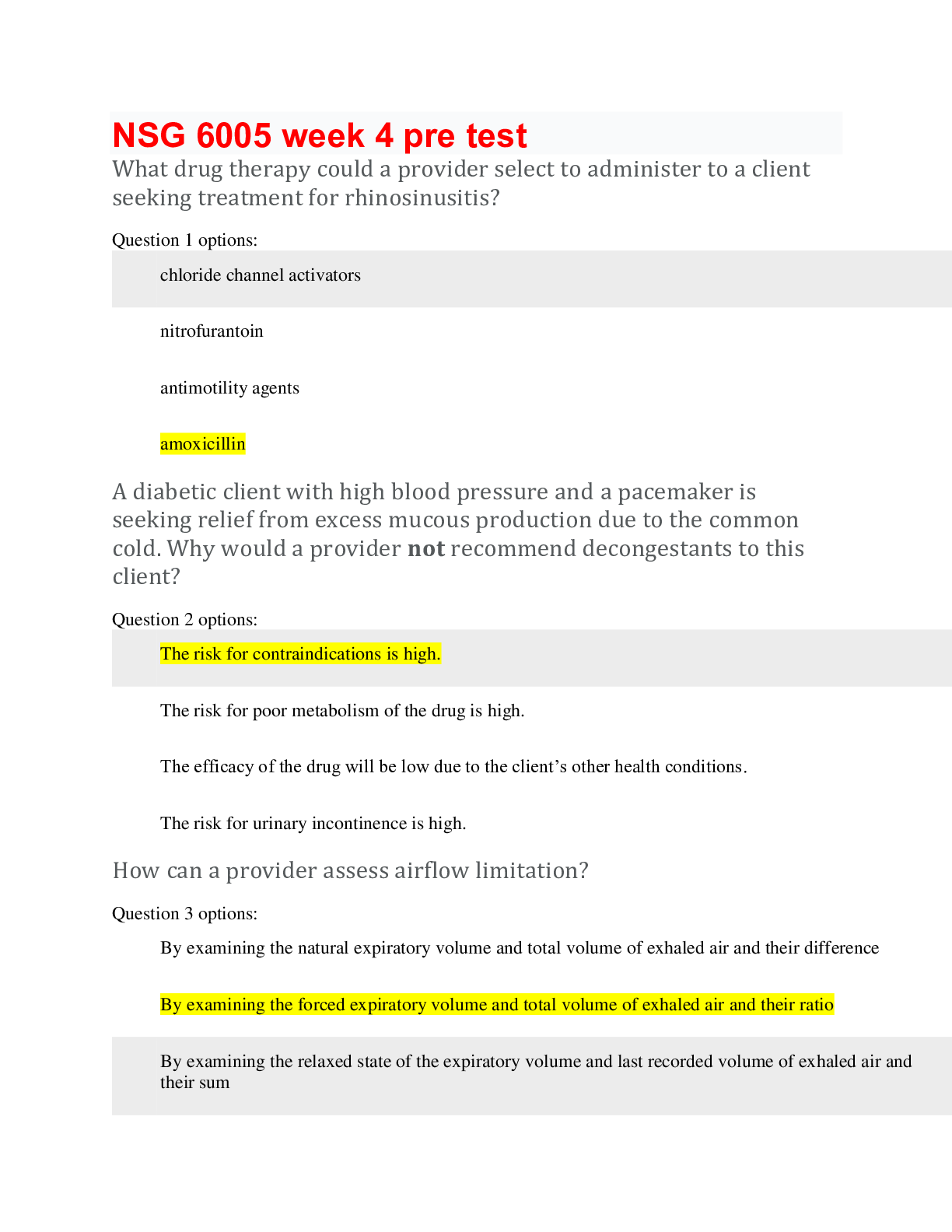
NSG 6005 week 4 pre test Questions And Answers
What drug therapy could a provider select to administer to a client seeking treatment for rhinosinusitis? Question 1 options: chloride channel activators nitrofurantoin antimotility agents am...
By Good grade , Uploaded: Jul 06, 2020
$4
Document information
Connected school, study & course
About the document
Uploaded On
Oct 21, 2019
Number of pages
6
Written in
Additional information
This document has been written for:
Uploaded
Oct 21, 2019
Downloads
0
Views
89






